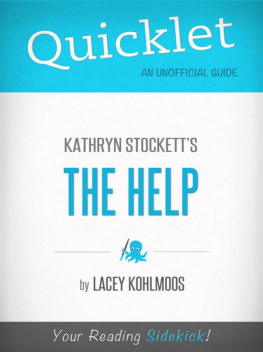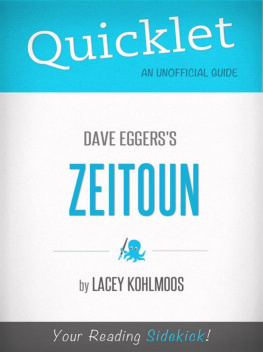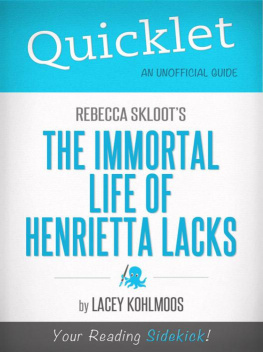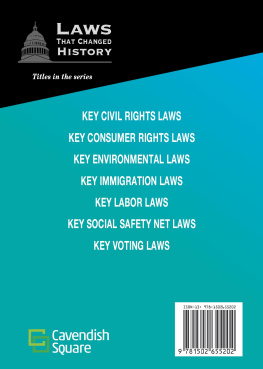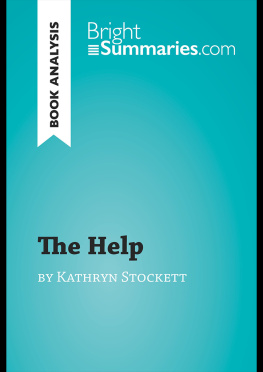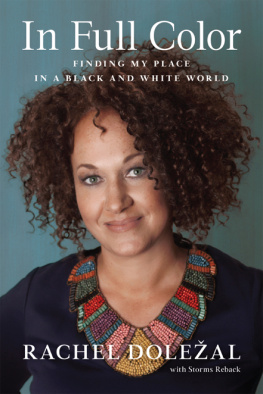Quicklet on Kathryn Stockett's The Help
About The Help
Wasnt that the point of the book? For women to realize, we are just two people. Not that much separates us. Not nearly as much as Id thought.
It is the early 1960s and the world is beginning to change, but not in Jackson, Mississippi. Old white families run the city from their farms, formerly called plantations. The Junior League is full of former debutantes who love nothing more than to gossip about what Jackie Kennedy is wearingand about each other. The sole goal of every woman is to get married, which is the only real reason to go to college, and youre a spinster if you havent landed a man by 23. Jim Crow Laws dictate all race relations, and the Civil Rights Movement hasnt taken hold here yet. Racial tensions are rising, but the black maids still go to work sitting in the back of the bus. White babies are raised by black women, and then taught to hate them by white parents who only come on the scene once the kids are potty trained.
This is the setting for Kathryn Stocketts runaway 2009 hit novel, The Help . It tells the story of three women who dare to give a voice to the black maids of Jackson. Although the project is rife with danger, Skeeter Phelan, Aibileen Clark, and Minny Jackson compile a book of stories about working for white women told from the perspective of the black maids.
The Help is a story about racism and the relationships between white and black women. A staple on the New York Times Bestseller list, the novel has sold millions of copies all over the world. Its popularity has been compared to that of Dan Brown and Harry Potter books. The Help was even adapted into a movie in 2011 that starred Emma Stone as Skeeter.
Some believe that The Help is a daring novel that manages to address heavy racial issues while still remaining entertaining and light. Some believe that though it is a valiant attempt by a white woman to get in the mentality of black women, it falls short of being an accurate representation. And still others believe that The Help is racist for a whole list of reasons, at the top of which is the use of a heavy African American dialect that some have found offensive.
There is one thing, however, that everyone agrees on: The Help is an entertaining novel that has sparked a very important debate about racism and race relations all over the world.
About Kathryn Stockett
All my life Id been told what to believe about politics, coloreds, being a girl. But with Constantines thumb pressed in my hand, I realized I actually had a choice in what I could believe.
Kathryn Stockett was born in 1969 in Jackson, Mississippi , where she also grew up. Her parents divorced when she was six and she was raised largely by her grandparents and their maid, Demetrie. Her mother was a young, attractive wild woman who was often travelling with her journalist boyfriend. When Stocketts father had custody of his kids, he stuck them in one of the Ramada Hotels that he owned. Moving around a lot with almost no parental supervision, Demetrie was the major stabilizing force in Stocketts young life .
Stockett received her Bachelor of Arts in English and Creative Writing from the University of Alabama and then moved to New York City. She worked in New York for nine years in magazine publishing and marketing. It was during this time that Stockett began to understand the strangeness of her childhood growing up in the south.
Stockett published her first novel, The Help , in 2009 based on her remembrances of Demetrie and growing up as a white woman in 1970s Jackson, Mississippi. The Help became an instantaneous international hit that continues to hold a spot on the New York Times Bestseller List over two years late. It was then adapted into a Dreamworks movie in 2011.
Stocketts unexpected success was clouded, however, by a 2011 divorce with her husband of 10 years, tech salesman Keith Rogers. The divorce was amicable and they share custody of their daughter, eight-year-old Lila.
Stockett currently lives in Atlanta, Georgia where she is working on a follow-up novel set during the Depression.

Kathryn Stockett (in black) posing with librarians in 2009
Via Flickr
Overall Summary
Everyone knows how we white people feel, the glorified Mammy figure who dedicates her whole life to a white family. Margaret Mitchell covered that. But no one ever asked Mammy how she felt about it.
As Aibileen readies Mrs. Elizabeth Leefolts house for the usual bridge game with Hilly Holbrook, Hillys mother, and Skeeter Phelan, she feels the now familiar pang of dissatisfaction sticking her in the gut. Its been there ever since her son was killed in an accident at work and dropped off at the emergency room door like a pile of garbage. Aibileen thought that she would never survive after her boys death, but here she is working in Mrs. Leefolts house taking care of her little girl Mae Mobley. The only good thing about that house is Mae Mobley, a sweet little thing with a mama who can barely stand to look at her.
Eugenia Skeeter Phelan has just returned home from college and she doesnt know what to do with herself. Her best friends from high school, Elizabeth Leefolt and Hilly Holbrook, are married with kids and her beloved maid Constantine has disappeared. Her mother wont stop trying to get her married off, but all Skeeter wants is to be a writer.
Minny Jackson has done it again. She got fired again for her big mouth. Only this time was different. She crossed Mrs. Hilly Holbrook this time and done something that she cant even speak about out loud. Now the all-powerful and thoroughly spiteful Hilly has blacklisted Minny and no white woman in Jackson will hire her on as a maid. That is until Celia Foote offers her a job. Celia looks like a floozy, cant cook, and is shunned by the Jackson ladies for being white trash, but she is a good person who becomes the best employer that Minny has ever had.
After a New York publisher expresses an interest in Skeeters idea to write a book about maids working for white women in Jackson, she approaches Aibileen for an interview. At first Aibileen refuses due to the danger of such a venture. When Hilly starts her campaign to require all white houses to have separate bathrooms for the black domestic help and Elizabeth installs just such a bathroom in her garage, Aibileen knows that she must do something and agrees to help with Skeeters book.
As racial tensions rise in Jackson and Hilly becomes more and more vicious, Minny decides to sign on to help Skeeter with the book. Soon the trio has over a dozen women helping them out. As the book progresses, Skeeter begins to get a better understanding of the horrible injustices that have been happening in Jackson for years. As she becomes more outspoken against Hilly and the racist beliefs that permeate the white community, she becomes a social pariah.
When the book is finally published and the women of Jackson realize that it is about them, there is an uproar. Hilly is ready to find and expose the writers until she reads the last chapter of the book that tells the story of how Minny made one of her famous pies for Hilly, but added a special ingredient. It wasnt until Hilly had eaten two slices that Minny revealed that she had mixed in some of her own shit. After Hilly read that chapter, she realized that she could not let the world think that the book was about Jackson, or else everyone would know that she ate Minnys shit.
Minny and Aibileen do end up feeling Hillys wrath, but they both move on with their lives. Minny leaves her abusive husband and plans to support her children with proceeds from the book and a permanent job with Celia. Elizabeth fires Aibileen, who then begins a career as a writer for the local newspaper. Skeeter escapes Jackson and takes a job as a copy editor in New York.

